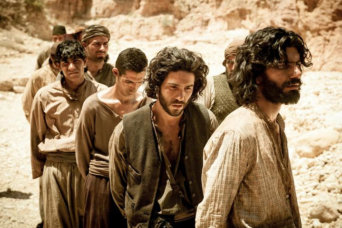- About
- Topics
- Picks
- Audio
- Story
- In-Depth
- Opinion
- News
- Donate
- Signup for our newsletterOur Editors' Best Picks.Send
Read, Debate: Engage.
The slaughter of Armenians is one of the darkest chapters of the First World War. 1.5 million people were then killed. The tragic consequences of these events 100 years ago are felt to this day.
Now German President Gauck has referred the massacres of Armenians as "genocide." Genocide was defined by the UN in 1948 as "acts committed with intent to destroy, in whole or part, a national, ethnical, racial or religious group." In Gauck’s yesterday speech in memory of the victims he also spoke about the German participation. German troops were alleged to have been involved in planning and even implementing deportations.
"The fate of the Armenians is an example of the history of mass destruction, ethnic cleansing, deportation - yes, of the genocide - that has marked the 20th century in such a horrible way."
During World War I Christian Armenians were systematically expelled and killed in the Ottoman Empire. They were accused to be collaborators with the enemy. The issue still divides the Turkish and Armenian governments. Turkey as the successor state of the Ottoman Empire rejects the term "genocide" vehemently. The winner of the 2006 Nobel Prize in Literature, the Turkish writer Orhan Pamuk, who put himself out for the process of coming to terms with the Armenian genocide, was indicted from an Istanbul district attorney Pamuk in 2005 for violation of Article 301 of the Turkish Penal Code, the so-called "public insulting Turkishness". The Armenian-Turkish journalist Hrant Dink, who dared to address in his articles as the first Turkish-Armenian the genocide has paid for this courage with his life. A juvenile assassins shot Hrant Dink on 19 January 2007 at the office of the newspaper "Akos" in Istanbul after Dink was also sentenced in 2006 after § 301.
Only 20 countries - France and Russia among them - have so far recognized the Armenian killings as genocide. Still, none of the stratetic and NATO - partners demand from the Turkish government an official acknowledment nor the ratification of the Paris Agreement in which the Armenians redress was promised.
Turkey claims the 1.5 million figure is inflated and that those who died were killed as a result of war and unrest rather than a policy of genocide. On Wednesday evening, the Turkish government had withdrawn its ambassador from Vienna in protest against a resolution of the Austrian Parliament.
In the Armenia capital, Yerevan a big commemoration will take place today, on April, 24th when the genocide started in 1905. Among others, the Russian President Vladimir Putin and the French President François Hollande are expected. The Minister of State at the Foreign Office, Michael Roth, represents Germany. As every year hundreds of thousands of Armenians are going to pilgrimage to the cultural sites.
Already last year the German-Turkish award-winning director Fatih Akin brought this part of the Armenian history into the international cinemas. His remarkable film “The Cut” centers on an Armenian father who travels from the 1915 Ottoman Empire to the U.S. in search of his daughters.
Along with Akin, Armenian-American screenwriter Mardik Martin, who has also worked with legendary filmmaker Martin Scorsese, penned the screenplay of the drama.
“I know very well that Turks would not accept a film about an Armenian hero. This is why I used the genocide of Native Americans to develop empathy with them,” Akin has said about the film that is worth to watch in order to understand.
Photo: Scene from the movie „The Cut“, Pandora Filmverleih
Video: THE CUT a film by Fatih Akin
Frequently Asked Questions about the Armenian Genocide
